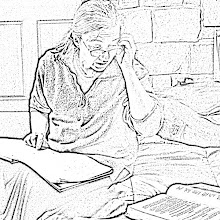“Mom, listen to this,” my son interrupted my morning work at the computer. He had The Yanks Are Coming by Albert Marrin in his hand, the book I assigned for history.
War is full of accidents, Jacob read. When millions of men struggle with powerful weapons, something always goes wrong. A defective grenade may explode in its owner’s hand when he pulls the pin. Pilots strafe their own ground troops. Artillerymen misjudge their aim and drop shells on their own troops. This is called “friendly fire,” although the shells kill just the same as if they came from enemy guns.
Someone, somehow, had made a terrible error. The Lost Battalion began to receive a heavy doses of friendly fire. Shells hit trees, sending them toppling over as if felled by a giant axe. Shells landed in foxholes. One man vanished in a flash; another had his chest blown out by an American shell.
Everyone tried frantically to dig himself deeper into the ground – everyone, that is, except Galloping Charlie. He was on his feet, bounding from foxhole to foxhole. “Take it easy, there, take it easy,” he said to a whimpering Doughboy. “We’re all right. This won’t last long.”
Rushing toward the headquarters hole, he motioned the pigeon man to follow him with this birdcage. Whittlesey’s message said it all: “We’re along the road parallel 276.4. Our artillery is dropping a barrage directly on us. For heaven’s sake, stop it.” The message was clipped to the leg of Cher Ami, the last pigeon, the Lost Battalion’s last link with the outside world. Cher Ami is French for “Dear Friend.” And that little bird proved itself the dearest of friends that day.
Not that it seemed that way at first. Cher Ami rose into the air and then, for some bird’s-own reason, settled on the limb of a blasted tree. The major and its keeper threw pebbles at it, ducking all the while from the shellbursts. At last Cher Ami took off and flew away. The Germans, seeing it leave the American position, turned all their guns on the tiny creature.
Cher Ami saved the day. It arrived at its loft with an eye gone, its breastbone shattered, and a leg shot away. But it arrived with Whittlesey’s message. The barrage was called off after four hours.
And there’s more about the pigeon. Jacob flipped forward a few pages.
Cher Ami also had its reward. The hero-pigeon went on to become a celebrity. The French gave it the Croix de Guerre. Black Jack ordered that it be returned to the United States in a private cabin aboard the transport Ohioan. It received the best medical treatment the country could offer, including a beautifully carved wooden leg. When Cher Ami died in 1919, its body was stuffed and put on honorable display in the Smithsonian Institution in Washington, D.C.
“I wonder if it’s still there,” Jacob mused. “I would have liked to have seen it when I was in Washington.”
“I didn’t realize they used carrier pigeons during the First World War,” I said, truly amazed. “That’s so low-tech. What a change in the way war is carried out since 90 years ago!”
All through the morning, Jacob interrupted my work to read me passages from The Yanks Are Coming.
Time was running out for the Lost Battalion. The last scraps of food had been eaten two days earlier and the men were starving. Those who could manage it gnawed the bark off trees or munched handfuls of grass; a lucky few nibbled on wax candles. Men were so weak from hunger and groggy from lack of sleep that it was hard to walk even a couple of steps. Men would rise, only to trip on a pebble. The medics ran out of painkiller and bandages. Fresh wounds had to be covered with dressings taken from the dead and folded so the old bloodstain didn’t touch the new wound.
At midday thirteen American planes dropped food packages to the Lost Battalion. Corned Willie, monkey meat, butter, biscuits, chocolate, cigarettes rained from heaven. The famished men watched the food parcels come down – right into the German positions. The Germans, who hadn’t seen such delicacies in months, were grateful for the early Christmas presents. When an inexperienced machine gunner aimed at the planes, a veteran knocked him down, shouting, “Don’t shoot the delicatessen-flyers!”
The Germans, refreshed by the fine food, ended the day with a flamethrower attack. Storm Troopers charged from the woods behind streamers of orange fire. That was a mistake, for the Yanks, angry at losing their food drop, took out their anger on the flamethrower teams. None survived.
He read about Alvin York, who used his sharp-shooting rifle skills to capture 132 machinegun-toting Germans. That was no small feat.
He read about Eddie Rickenbacker, who disobeyed orders and took off in his plane after armistice had been reached to get a bird’s-eye view of helmets being thrown in the air and Frenchmen hugging and kissing Germans.
I don’t recall Jacob ever reading me so many passages from a book before. It’s so rewarding to choose a book that he was excited about, a book that made history come alive and gave personalities to people, a book that brought you close to the events.
“Did you ever read any history books in school that you enjoyed this much?” I asked Jacob.
“No,” he replied.
My heart ached because I love history. But it wasn’t because of classes in school. History only came alive for me after I graduated high school and began reading accounts of historical events in books on my own. Books like the one Jacob was reading.
“But I liked some of the historical videos,” Jacob added.
“We’ll be watching some videos, too,” I said. “And listening to some books on tape for a change.”
Oh, the possibilities when you homeschool!




